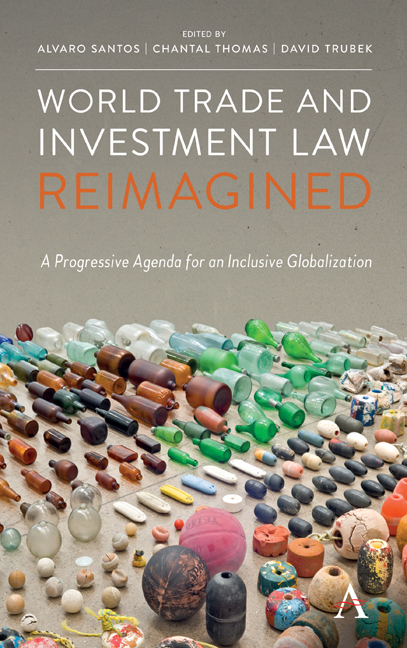Book contents
- Frontmatter
- Contents
- Acknowledgments
- List of Contributors
- Introduction World Trade and Investment Law in a Time of Crisis: Distribution, Development and Social Protection
- PART I RETHINKING THE POLITICAL ECONOMY OF TRADE: COMMENTS ON DANI RODRIK'S STRAIGHT TALK ON TRADE
- Chapter One Comments on Straight Talk on Trade
- Chapter Two Thoughts on Straight Talk on Trade
- Chapter Three Reading Rodrik: A Call for a New Law and Economics for International Law
- Chapter Four Reflecting on Straight Talk on Trade
- Chapter Five A Response to the Comments by Thomas, Gallagher, Shaffer and Santos
- PART II SETTING THE STAGE FOR A PROGRESSIVE VISION: EMERGING ISSUES IN WORLD TRADE AND INVESTMENT LAW
- SECTION 1 MAPPING THE NEW CONTEXT FOR TRADE AND INVESTMENT LAW
- SECTION 2 DEALING WITH MAJOR CHANGES IN THE WORLD ECONOMY
- SECTION 3 FRAMING A MORE EQUITABLE INVESTMENT LAW REGIME
- SECTION 4 SUPPORTING DEVELOPMENT
- SECTION 5 REINFORCING SOCIAL PROTECTION: SPREADING THE BENEFITS OF TRADE, DEALING WITH LOSSES AND EXPLORING THE TRADE–IMMIGRATION NEXUS
- Index
Chapter Five - A Response to the Comments by Thomas, Gallagher, Shaffer and Santos
from PART I - RETHINKING THE POLITICAL ECONOMY OF TRADE: COMMENTS ON DANI RODRIK'S STRAIGHT TALK ON TRADE
Published online by Cambridge University Press: 07 September 2019
- Frontmatter
- Contents
- Acknowledgments
- List of Contributors
- Introduction World Trade and Investment Law in a Time of Crisis: Distribution, Development and Social Protection
- PART I RETHINKING THE POLITICAL ECONOMY OF TRADE: COMMENTS ON DANI RODRIK'S STRAIGHT TALK ON TRADE
- Chapter One Comments on Straight Talk on Trade
- Chapter Two Thoughts on Straight Talk on Trade
- Chapter Three Reading Rodrik: A Call for a New Law and Economics for International Law
- Chapter Four Reflecting on Straight Talk on Trade
- Chapter Five A Response to the Comments by Thomas, Gallagher, Shaffer and Santos
- PART II SETTING THE STAGE FOR A PROGRESSIVE VISION: EMERGING ISSUES IN WORLD TRADE AND INVESTMENT LAW
- SECTION 1 MAPPING THE NEW CONTEXT FOR TRADE AND INVESTMENT LAW
- SECTION 2 DEALING WITH MAJOR CHANGES IN THE WORLD ECONOMY
- SECTION 3 FRAMING A MORE EQUITABLE INVESTMENT LAW REGIME
- SECTION 4 SUPPORTING DEVELOPMENT
- SECTION 5 REINFORCING SOCIAL PROTECTION: SPREADING THE BENEFITS OF TRADE, DEALING WITH LOSSES AND EXPLORING THE TRADE–IMMIGRATION NEXUS
- Index
Summary
I am truly grateful for this wonderful and gracious set of comments on my book Straight Talk on Trade: Ideas for a Sane World Economy. An author cannot wish for more than this: to have his work taken seriously, and then elaborated or critiqued in light of further reflection. Kevin P. Gallagher, Alvaro Santos, Gregory Shaffer and Chantal Thomas do that and much more in a relatively small amount of space. What follows are some quick responses and rejoinders to their rich arguments.
I begin with Kevin P. Gallagher's point that perhaps I have been too hard on economists. I happily accept his corrective! Indeed, many other social scientists were complicit in misreading the consequences of the type of globalization we had embarked upon. This is especially true of mainstream international relations theorists in political science. Typically, these scholars took their cue from economists when they assumed the overall gains were large and the losers could be treated as merely rent seekers in the political system. Even though they should have known better, they treated trade agreements as efficiency-enhancing arrangements instead of the political documents that they were.
In a recent lecture, Robert Keohane, one of the most distinguished scholars of international relations, was quite honest about the shared responsibility and engaged in some self-criticism:
“Those of us who have not only analyzed globalization and the liberal order but also celebrated them share some responsibility for the rise of populism. We did not pay enough attention as capitalism hijacked globalization. Economic elites designed international institutions to serve their own interests and to create firmer links between themselves and governments. Ordinary people were left out.”
As Keohane indicates, and as I argue in the book, the policies pushed by the US elite undermined what another political scientist, John Ruggie, called “embedded liberalism.” Too many international relations scholars overlooked the consequences.
Alvaro Santos provides a deep and nuanced reading of the book and raises three important questions. First, he is skeptical about the project of “model diagnostics” or “model selection” I advocate for applied economists. I propose this approach as a way of moving from a position of relative agnosticism (“there are many contending models”) to reasonable policy prescriptions (“the evidence indicates we can rule out these models while these other ones may well apply”).
- Type
- Chapter
- Information
- World Trade and Investment Law ReimaginedA Progressive Agenda for an Inclusive Globalization, pp. 59 - 62Publisher: Anthem PressPrint publication year: 2019

